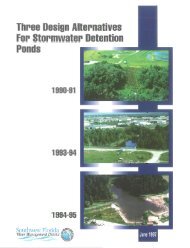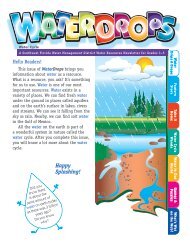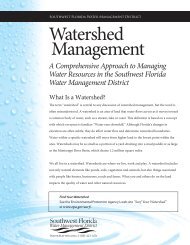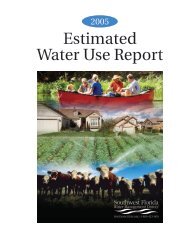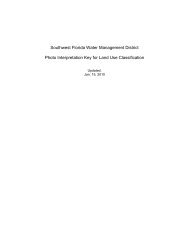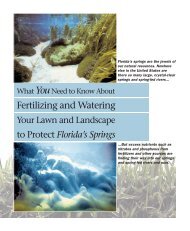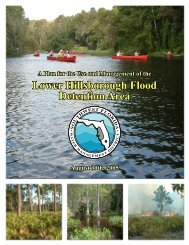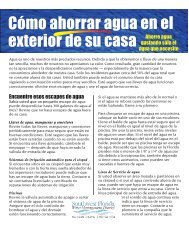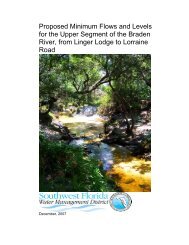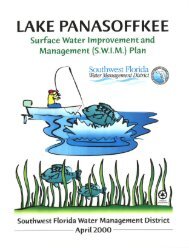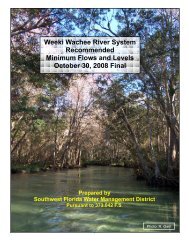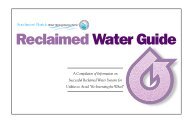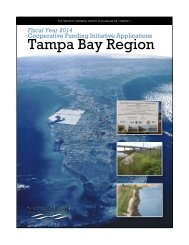notebook - Southwest Florida Water Management District
notebook - Southwest Florida Water Management District
notebook - Southwest Florida Water Management District
You also want an ePaper? Increase the reach of your titles
YUMPU automatically turns print PDFs into web optimized ePapers that Google loves.
5. Summarize impacts to wetlands and other surface waters:<br />
a. For all projects with wetlands or other surface waters on site, complete Tables 1, 2 and 3, as<br />
applicable;<br />
b. For docking facilities or other structures constructed over wetlands or other surface waters,<br />
complete Table 4;<br />
c. For shoreline stabilization projects, complete Table 5.<br />
C. Plans<br />
Provide clear, detailed plans for the proposed system which include specifications, plan, cross-section<br />
and profile views of the proposed project. The plans must be signed and sealed by an appropriate<br />
registered professional as required by law. These plans should show or include the following, as<br />
applicable:<br />
1. Project and total land area boundaries, including distances and orientation from roads or other<br />
landmarks.<br />
2. Existing land use, land cover, and on-site natural communities, including wetlands, other surface<br />
waters, aquatic communities, and uplands (acreage and percentages). Use the USF&W Service's<br />
Classification of Wetlands and Deepwater Habitats of the United States for wetlands or other<br />
surface waters on the project site. Assign each wetland or other surface water a unique<br />
identification number which is consistent in all exhibits.<br />
3. Existing topography extending at least 100 feet off site and includes adjacent wetlands and other<br />
surface waters. All topography shall include the location and a description of known benchmarks,<br />
referenced to NGVD. For systems waterward of mean high water (MHW) or seasonal high water,<br />
show water depths at mean low water (MLW) in tidal areas or normal pool in non-tidal areas. For<br />
docking facilities show the location, depths and access to the nearest navigational channel.<br />
4. Floodplain boundary and approximate flooding elevations if the project is in the known floodplain of<br />
a stream or other water course. Identify the 100-year flood elevation and floodplain boundary of<br />
any lake, stream or other watercourse located on or adjacent to the site.<br />
5. Boundaries of wetlands and other surface waters within the project area. Distinguish those<br />
wetlands and other surface waters that have been delineated by any binding wetland determination.<br />
6. Proposed land use, land cover and natural communities, including wetlands, other surface waters,<br />
undisturbed uplands, aquatic communities, impervious and semi-impervious surfaces, and water<br />
management areas (acreage and percentages). Use the same classification system and<br />
identification number used in C.2. above.<br />
7. Proposed impacts to wetlands and other surface waters.<br />
8. Locations of buffer zones abutting wetlands.<br />
9. Pre and post-development drainage patterns and basin boundaries. Show the direction of flow,<br />
including any off-site runoff being routed through or around the system and connections between<br />
wetlands and other surface waters.<br />
10. Location of all water management areas with details of size, side slopes and design water depths.<br />
11. Location and details of all water control structures, control elevations, any seasonal water level<br />
regulation schedules and the location and description of benchmarks (minimum of one benchmark<br />
per structure).<br />
FORM 547.27/ERP (084/1109) Section E - Page 2 of 5 RULE 40D-4.101(1)(b), F.A.C.<br />
34



